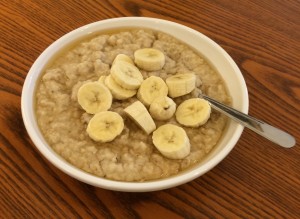Almost five years of living in Russia meant I had to have an opinion about “kasha”. In English: porridge. The buckwheat-based breakfast was a cultural staple; as the wry old saying goes “cabbage soup and porridge are our food!” Waking up to winter temperatures of below minus 30 made me understand why Goldilocks risked the wrath of the three bears.
Being English, I preferred oats to buckwheat. And I also remembered my grandmother’s advice that porridge made with water prevented indigestion. Despite reservations about taste and a few concrete experiments, I finally found a way to make a milk-free version that was tasty, and less like something used to grout the downstairs loo.
Nutritionists widely agree that porridge is a super food. An excellent source of slow-release-energy carbohydrate, oats are low in fat, salt and sugar. They are also high in fibre, and rich in vitamin E, several B vitamins, and essential minerals, particularly manganese, zinc, and silica that boosts bones, hair, skin and nails.
In addition, Gran was right: oat-based porridge can help soothe indigestion and bloating, as well as prevent constipation, reduce cholesterol and strengthen the heart. They are also recommended for sufferers of diabetes and hepatitis, and there are gluten-free versions for coeliacs.
Furthermore, as the old adage “sowing your wild oats” implies, the humble oat can reportedly boost libido, and ease the effects of stress. Finally, a tincture of oats may help alleviate drug and alcohol withdrawal symptoms, and reduce the cravings for cigarettes. Powerful stuff, indeed.
So, what’s in them? A 40-gramme serving of porridge oats, made with water, provides the following nutrients, and their proportion of an adult’s daily requirements:
1. Calories: 147 = 7% of the average adult daily intake of 2,000 calories
– Carbohydrate 22.4g
Sugars 0.4g = less than 1% of the daily intake
2. Fat 3.4g = 5% of the 70g daily intake
– Saturates 0.5g = 3% of the 20g daily intake
3. Fibre 3.6g
4. Protein 4.8g
5. Salt trace = less than 1% of the 6g daily intake
Two final tips. Use one measurement of porridge to one-and-a-half of water for optimum consistency. And add a chopped banana and tablespoonful of honey for a super energy boost.
Long live, porridge! And porridge for a long life.


Comments are closed.